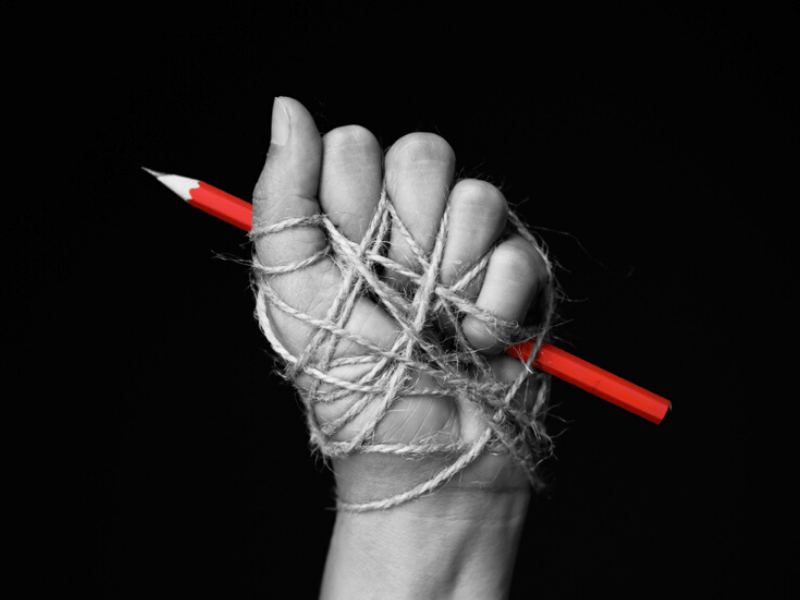The need for transparent and uncensored information was the main message across statements by international press freedom organisations and representatives marking World Press Freedom Day today.
The issues that continue to undermine press freedom came to the fore during the COVID-19 pandemic, used by authoritarian governments to increase restrictions on media workers despite the need for clear and open information to citizens.
Harlem Désir, the OSCE Representative on Freedom of the Media, said in a video message to mark the occasion, that the media had an even more crucial role to provide information to the public than ever.
“Our health depends not only on readily accessible healthcare but also on access to accurate information on the pandemic, its evolution and ways of protecting ourselves and others,” he said, stressing that a democratic society cannot survive without free press freedom.
#WorldPressFreedomDay #WPFD2020 is a reminder that our societies cannot thrive without a free press. In times of global pandemic we need free media and journalists working unhindered to provide us with reliable information. Watch my video: https://t.co/vdJ1D0GM38
— OSCE media freedom (@OSCE_RFoM) May 2, 2020
“Let journalists work,” Désir said. He has supported the campaign for justice for slain journalist Daphne Caruana Galizia, attending her funeral and addressing a press conference by Reporters Without Borders in Malta on the second anniversary of her assassination.
When Prime Minister Robert Abela nominated former Minister Konrad Mizzi to head the Maltese delegation to the OSCE assembly, Désir was critical defining the choice as “incomprehensible and disturbing”.
Désir was among a number of international organisations and bodies drawing attention to the problems journalists face on the job. The theme chosen for World Press Freedom Day this year is ‘Journalism without Fear or Favour’.
A similar message was conveyed by the General Secretary of the European Federation of Journalists. Ricardo Gutiérrez said that with 142 reported cases of serious media violation on press freedom in Europe last year, the situation remained drastic. He referred to two journalists killed in Northern Ireland and Ukraine.
Journalists have never before been subjected to as much violence and abusive treatment, @Molenews1 of @EFJEUROPE tells us about the new Report of the @CoEMediaFreedom partner organisations.
More👉 https://t.co/BMwcvbO4fc#EuropeForFreeMedia #WorldPressFreedomDay #WPFD2020 pic.twitter.com/5vd7cfzILD— Council of Europe Media Freedom (@CoEMediaFreedom) May 3, 2020
Gutiérrez referred to Hungary, Russia and Romania among those States coming down hard on journalists, and where the gagging of the free press is being presented as a fight against misinformation.
Malta has also been spotlighted as a country where press freedom has been plummeting. Recently, the Council of Europe’s platform for media freedom and safety of journalists listed Malta as a “country of exceptional concern” in its 2020 annual report.
Malta’s nosedive in press freedom rankings followed the death of journalist Daphne Caruana Galizia in 2017 and subsequent doubts on investigations into those who commissioned her murder.
In the last two years, Malta’s ranking plunged 30 places. In the 2020 World Press Freedom Index published last month, Malta fell another four places. Malta now ranks 81, categorised as ‘problematic’.
Malta’s new score now sits directly beneath that of Hong Kong and above that of Kyrgyzstan and Haiti, which was singled out in the Index as suffering one of the “biggest declines” in press freedom rankings, dropping 21 places.
On World Press Freedom Day, Reporters Without Borders (RSF) is publishing exclusive interviews with Washington Post columnist Rana Ayyub, whistleblower Edward Snowden, and Nobel laureate Joseph Stiglitz. They will be joined by the organisation’s Secretary-General Christophe Deloire.
RSF UK Bureau Director Rebecca Vincent said the fight for justice for murdered journalists was still ongoing. “I’m thinking of courageous journalists who have lost their lives in pursuit of the truth. We will never stop fighting for justice for Jamal Khashoggi, Daphne Caruana Galizia, Christopher Allen and so many others – and for better protections for journalists everywhere.”
On #WPFD2020, I’m thinking of courageous journalists who have lost their lives in pursuit of the truth. We will never stop fighting for justice for Jamal Khashoggi, Daphne Caruana Galizia, Christopher Allen & so many others – and for better protections for journalists everywhere.
— Rebecca Vincent (@rebecca_vincent) May 3, 2020
Mapping Media Freedom, a portal managed by the European Centre for Press and Media Freedom (ECPMF) that registers threats against media workers, released troubling statistics. Out of the 5,086 threats to journalists, over 1,000 reports (over 30%) were about threats that came from government or State agencies.
“We remind governments of their role as protectors and not predators of the free press,” the organisation said.
Audrey Azoulay, Director-General of UNESCO, said everyone must consider the vital importance of information in the current situation. The organisation teamed up with two social media campaigns aimed at protecting information: ‘Together for Facts, Science and Solidarity’ and ‘Don’t Go Viral to fight the “infodemic”.












